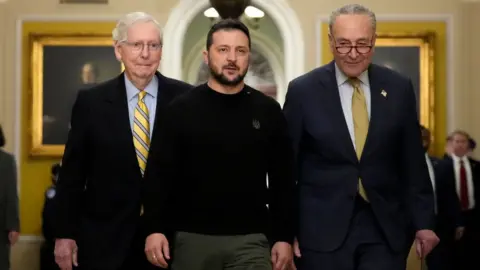Zelensky pleads for more aid amid standoff in US Congress
Ukrainian President Volodymyr Zelensky has urged the US to back more aid to Kyiv, with a plea that some lawmakers said has changed few, if any, minds.
Mr Zelensky visited leaders in Washington DC in a final push for $61bn (£49bn) in aid that has been sidelined by a standoff over US border policy.
Appearing with him at the White House, President Joe Biden said Congress must "compromise" and "prove Putin wrong".
But members of Congress told the BBC nothing had changed after the talks.
It was Mr Zelensky's third visit to the nation's capital since Russia invaded his country in February 2022.
Unlike his previous two visits, there was no red carpet entrance or ceremonial fanfare, reflecting the pessimism that surrounds efforts to win support for new funds.
The latest funding proposal has become embroiled in partisan domestic politics, with congressional Republicans insisting they will only support Ukraine aid if it is tied to sweeping immigration reform.
While Mr Biden and his Democrats are willing to spend more money on border security, they view the changes being demanded by Republicans as unacceptable.
Time is running out before the Christmas congressional break, leading to grim warnings from the White House and Kyiv about the prospect of the war effort without US support.
"I will not walk away from Ukraine," Mr Biden said in a joint news conference with Mr Zelensky on Tuesday evening.
"Ukraine will emerge from this war proud, free and firmly rooted in the West - unless we walk away."
Russian leader Vladimir Putin has been defied at every turn, he added, but was now banking on the US not coming through with more aid.
Mr Zelensky said it was "very important that by the end of this year we can send a very strong signal" to "the aggressor".
"Thanks to Ukraine's defence, other European nations are safe from the Russian aggression," he said.
 Getty Images
Getty ImagesEarlier in the day, the Ukrainian leader was flanked by Senate Majority Leader Chuck Schumer and his Republican counterpart Mitch McConnell as they entered closed-door talks with senators.
He then met one-on-one with Mike Johnson, the Republican Speaker of the House of Representatives, who has maintained his stance on pushing for border issues.
Speaking to reporters after their meeting, Mr Johnson gave no indication of being open to negotiate, even as he acknowledged further aid to Ukraine is important.
"The border is an absolute catastrophe," he said, warning that House Republicans won't budge until "transformative" changes are made.
"These are the conditions of the American people," Mr Johnson said. "We are resolute on that".
The Speaker blamed the White House for the hold-up, saying it has "no clear strategy to win" and cannot provide the "answers that the American people are owed".
Recent polls show a majority of Americans no longer support sending more money to Ukraine, and the opposition in Congress has grown more vocal in recent months.
Missouri Republican Senator Eric Schmitt said he had heard "nothing new" from Mr Zelensky and didn't think the Democrats "appreciate how committed Republicans are to securing our southern border".
"If you listen to the people back home, they're not interested in a blank cheque for Ukraine when they see 12,000 people coming across our open southern border every day," he told the BBC.
"Nothing's changed," said Senator Lindsey Graham of South Carolina. "I admire him, but he didn't change my mind at all about what we need to do."
Mr Graham accused Democrats of being "in denial about the border" and "trying to use [Mr Zelensky] in a way that I think wasn't helpful".
In the Oval Office with Mr Zelensky, President Biden warned it would be a "Christmas gift" to Mr Putin if Congress fails to pass fresh military aid for Kyiv.
Since Russia invaded Ukraine in February 2022, the US Congress has approved more than $110bn in military and economic aid to Ukraine. Much of that money has already been distributed.
The US has not just been critical to supporting Ukraine's war effort; it's also been largely responsible for coordinating that support.
Military experts have warned that Europe cannot backfill what the US is providing and that, without its support, there is a real danger Ukraine will lose the war - not immediately but in the longer term.
Nearly 5,000 miles away in snowy Kyiv, Ukrainians said what their leader is able to achieve on his US trip could be the difference between life and death.
"We hope for the help of our partners to end the war as soon as possible," said Alina, shaking her head at the idea of not receiving that aid.
By her side, Olga chimed in: "Since every average person understands that his life depends on it, everything depends on it… we believe that everything will be fine, that they will help us."
With additional reporting from Jessica Parker in Kyiv
